Human Rights Day is celebrated every year on 10 December. In 2020, we have seen how COVID-19 has further deteriorated the already difficult situation of many trans and gender-diverse people. Structural inequalities and disparities affecting trans people’s human rights have been worsened by the socio-economic and political impact of the pandemic.
In times of crises, those living in the margins tend to be left behind. Trans people who are homeless, sex workers, disabled, migrants, refugees, asylum seekers, poor, and/or elderly are not only affected by the virus itself, but also by the systemic barriers that have increased in the past months.
In May 2020, the European Union Agency for Fundamental Rights launched a report with findings from its 2019 survey on LGBTI people in the EU and North Macedonia and Serbia. It follows the agency’s first survey on LGBT people in the EU, conducted in 2012. With almost 140,000 participants, 19,445 of whom are trans people, it is the world’s biggest-ever survey of lesbian, gay, bisexual, trans and intersex people’s life experiences.
For Human Rights Day, TGEU has developed nine infographics based on the FRA report and, in part, the data explorer. In 2021, we will do an in-depth analysis on the basis of FRA’s raw data and launch a report.
Despite the EU’s legal commitment to protect those living in its territory, FRA’s survey results show little progress over the past seven years and indicate that discrimination and violence remain part of the daily experiences of LGBTI people. With COVID-19, the situation is even grimmer. Human rights and social justice cannot wait. Extraordinary emergencies cannot and should not excuse the violation of rights.
Most trans people in the EU are outside the binary
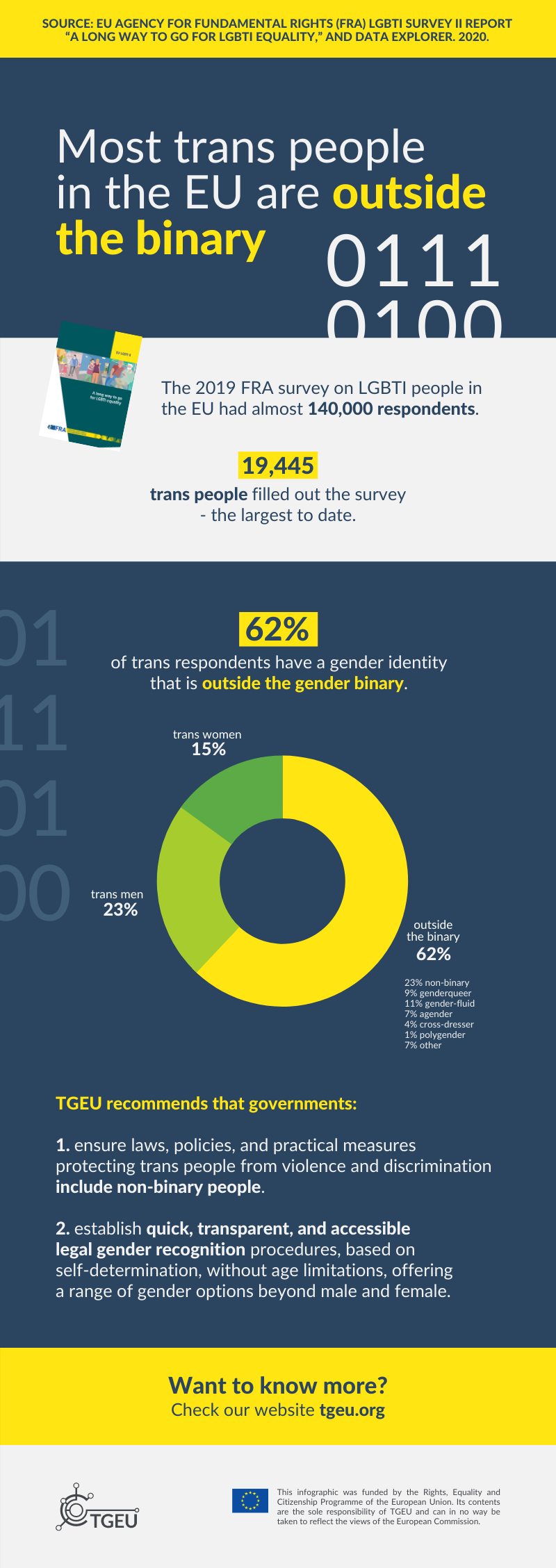
The 2019 FRA survey on LGBTI people in the EU had almost 140,000 respondents.
19,445 trans people filled out the survey – the largest to date.
The EU LGBTI Survey II found that 62% of trans respondents have a gender identity that falls outside the gender binary.
- 15% trans women
- 23% trans men
- 23% non-binary
- 9% genderqueer
- 11% gender-fluid
- 7% agender
- 1% polygender
- 7% other
- 4% cross-dresser
TGEU recommends that governments:
- Ensure laws, policies, and practical measures protecting trans people from violence and discrimination include non-binary people in all areas of life.
- Establish quick, transparent, and accessible legal gender recognition procedures, based on self-determination, without age limitations, offering a range of gender options beyond male and female.
Trans people face discrimination
The EU LGBTI Survey II found that 55% of trans respondents have felt discriminated against in at least one area of life in the 12 months before the survey.
This rate was an alarming 68% among trans respondents aged 15 to 17.
TGEU recommends that governments:
- Include gender identity and gender expression as protected grounds of discrimination in all areas of life and implement relevant EU law.
- Fund helplines for trans people, including youth, in collaboration with trans organisations.
- Establish quick, transparent and accessible legal gender recognition, based on self-determination, without age limitations, offering a range of gender option.
- Gather data on discrimination towards trans people, disaggregated by gender identity, race, ethnicity, disability, and other aspects.
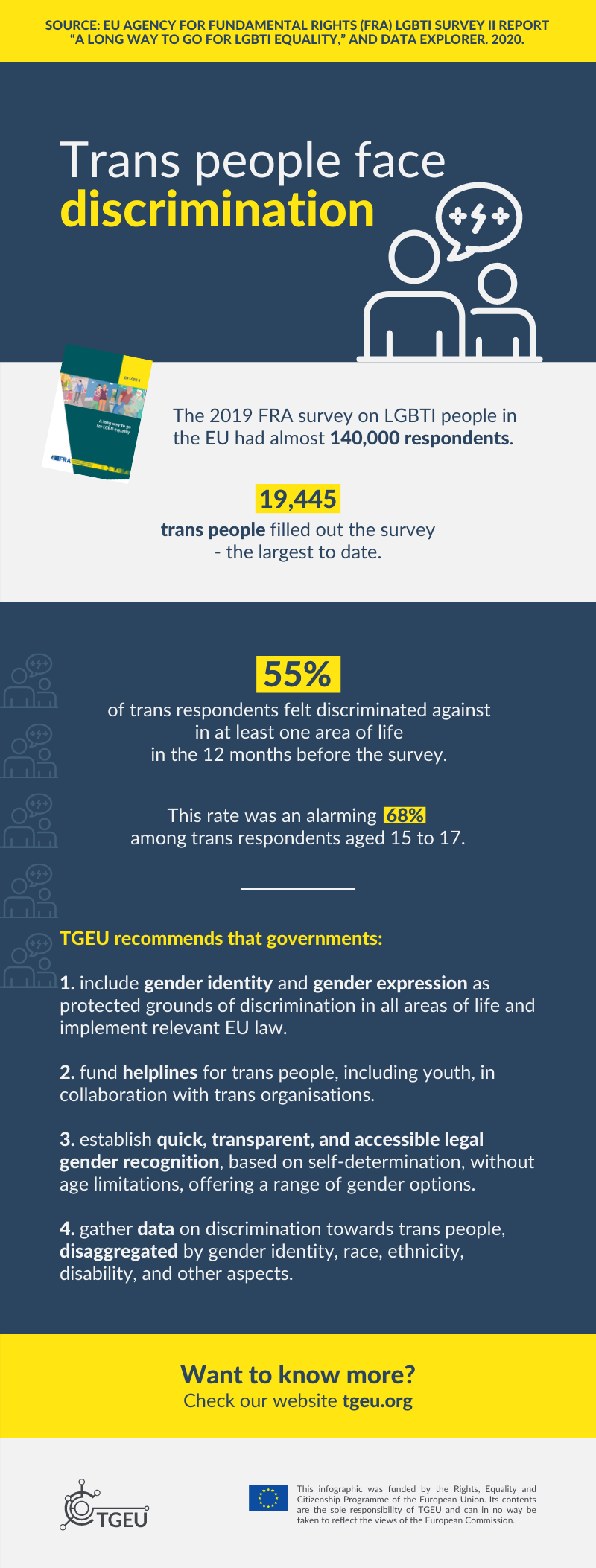
Trans people face harassment
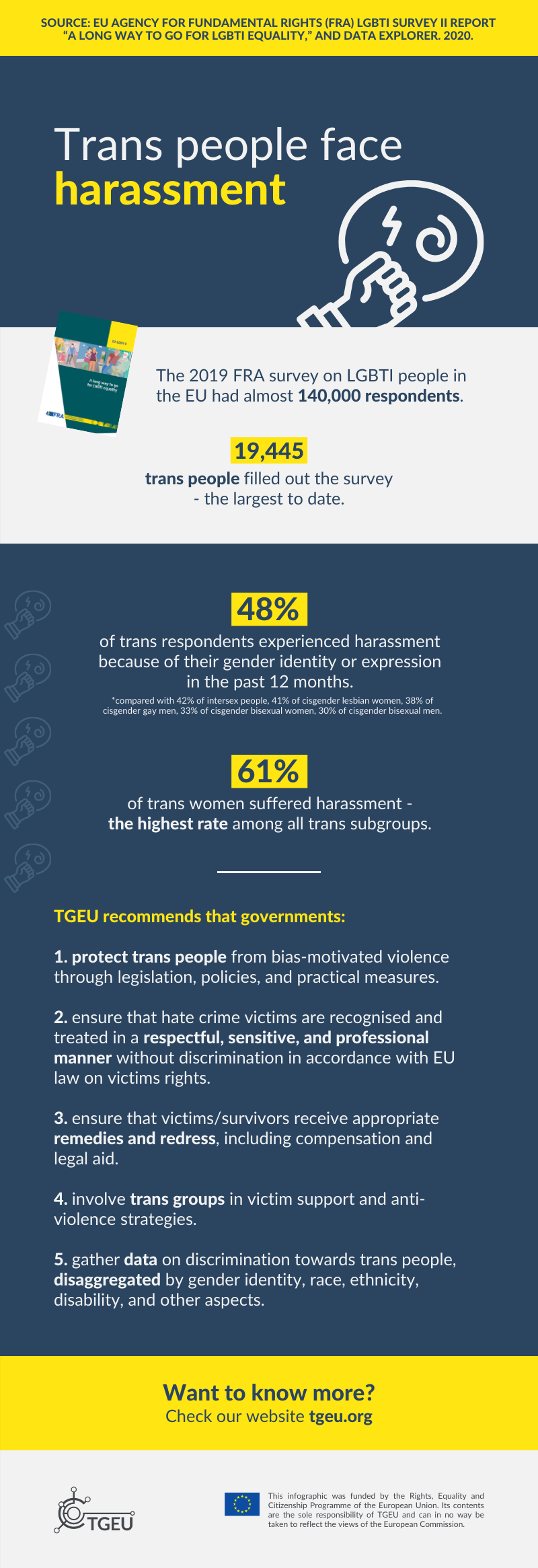
The EU LGBTI Survey II found that 48% of trans respondents experienced harassment because of their gender identity or expression in the past 12 months.
This is compared to 42% of intersex people, 41% of cisgender lesbian women, 38% of cisgender gay men, 33% of cisgender bisexual women, 30% of cisgender bisexual men.
61% of trans women suffered from harassment – the highest rate among all trans subgroups.
TGEU recommends that governments:
- Protect trans people from bias-motivated violence through legislation, policies, and practical measures.
- Ensure that hate crime victims are recognised and treated in a respectful, sensitive and professional manner without discrimination in accordance with EU law on victims rights.
- Ensure that victims/survivors receive appropriate remedies and redress, including compensation and legal aid.
- Involve trans groups in victim support and anti-violence strategies.
- Gather data on anti-trans violence, disaggregated by gender identity, race, ethnicity, disability, and other aspects.
Trans people are bullied at school
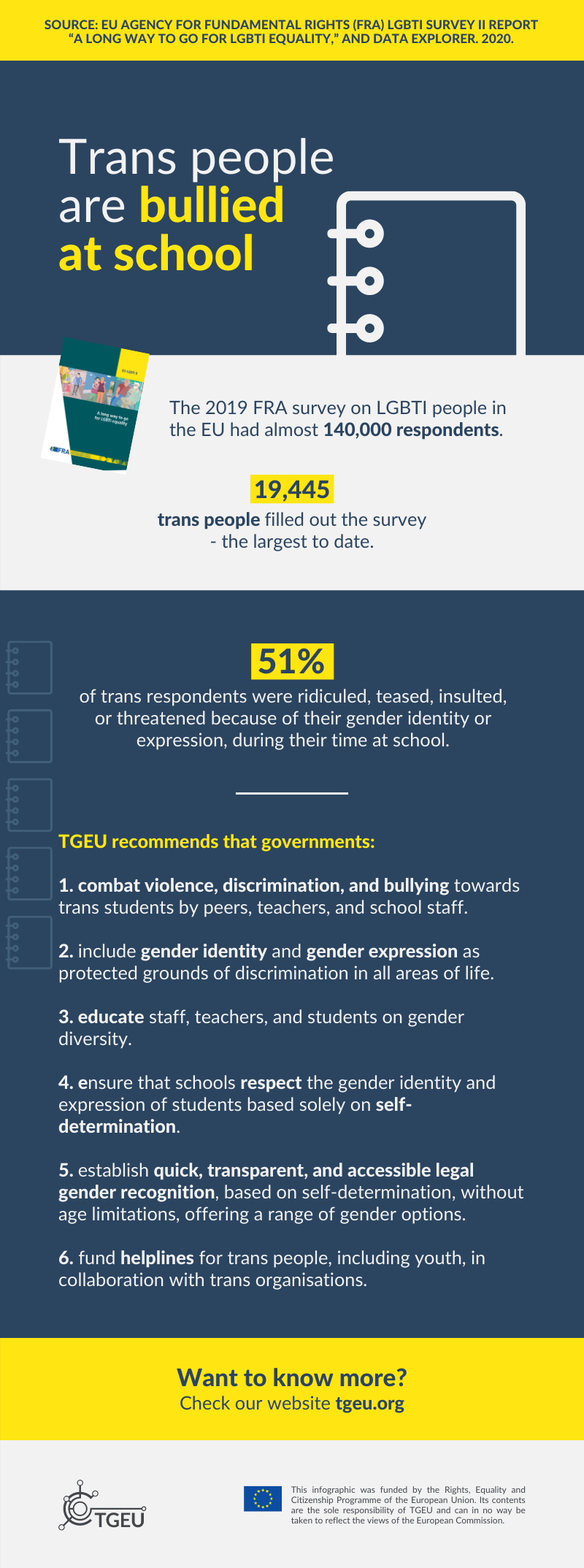
The EU LGBTI Survey II found that 51% of trans respondents were ridiculed, teased, insulted or threatened because of their gender identity or expression, during their time at school.
TGEU recommends that governments:
- Combat violence, discrimination, and bullying towards trans students by peers, teachers, and school staff.
- Include gender identity and gender expression as protected grounds of discrimination in all areas of life.
- Educate all staff, teachers, and students on gender diversity.
- Ensure that schools respect the gender identity and expression of students based solely on self-determination.
- Establish quick, transparent, and accessible legal gender recognition, based on self-determination, without age limitations, offering a range of gender options.
- Fund helplines for trans people, including youth, in collaboration with trans organisations.
Trans people are discriminated at work
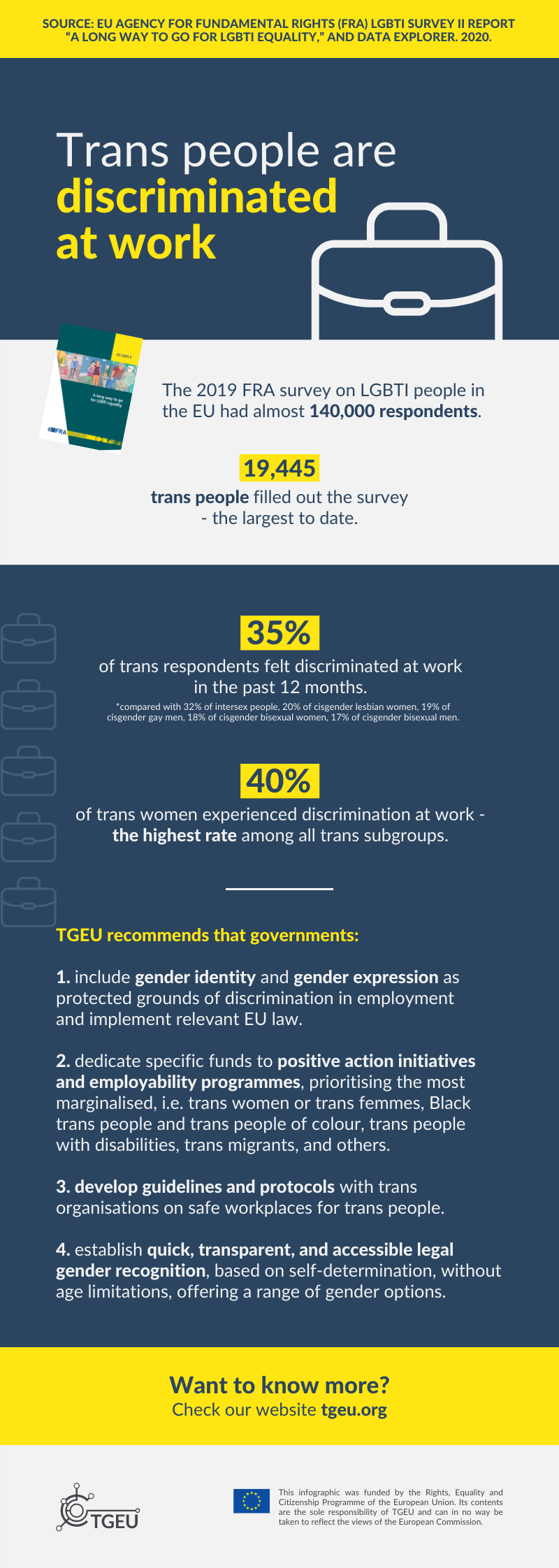
The EU LGBTI Survey II found that 35% of trans respondents felt discriminated at work in the past 12 months.
This is compared with 32% of intersex people, 20% of cisgender lesbian women, 19% of cisgender gay men, 18% of cisgender bisexual women, 17% of cisgender bisexual men.
40% of trans women experienced discrimination at work – the highest rate among all trans subgroups.
TGEU recommends that governments:
- Include gender identity and gender expression as protected grounds of discrimination in employment and implement relevant EU law.
- Dedicate specific funds to positive action initiatives and employability programmes, prioritising the most marginalised, i.e. trans women or trans femmes, Black trans people and trans people of colour, trans people with disabilities, trans migrants, and others.
- Develop guidelines and protocols with trans organisations on safe workplaces for trans people.
- Establish quick, transparent, and accessible legal gender recognition, based on self-determination, without age limitations, offering a range of gender options.
Trans people are discriminated in healthcare and social services
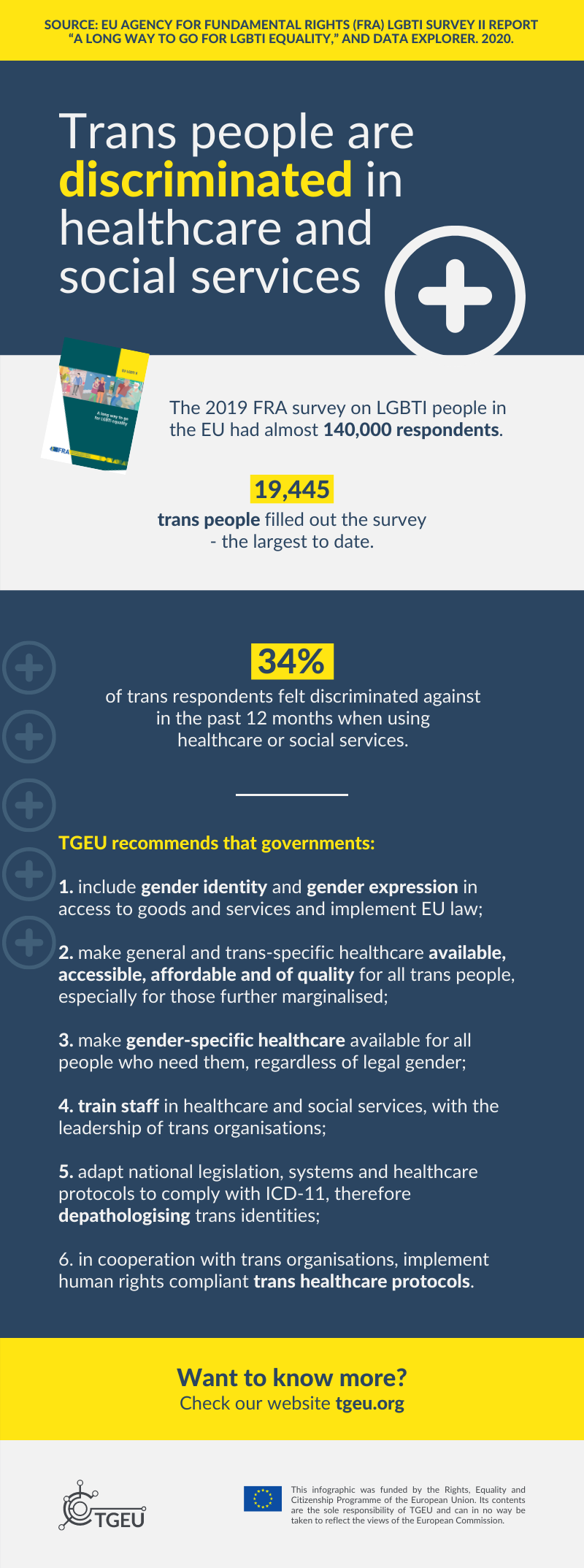
The EU LGBTI Survey II found that 34% of trans respondents felt discriminated against in the past 12 months when using healthcare or social services.
TGEU recommends that governments:
- Include gender identity and gender expression as protected grounds of discrimination in access to goods and services and implement EU law.
- Make general and trans-specific healthcare available, accessible, affordable and of quality for all trans people, especially for those further marginalised.
- Make gender-specific healthcare available for all people who need them, regardless of legal gender and train staff in healthcare and social services, with the leadership of trans organisations.
- Adapt national legislation, systems, and healthcare protocols to comply with ICD-11, therefore depathologising trans identities.
- In cooperation with trans organisations, implement human rights compliant trans healthcare protocols.
Trans people do not report violence to the police
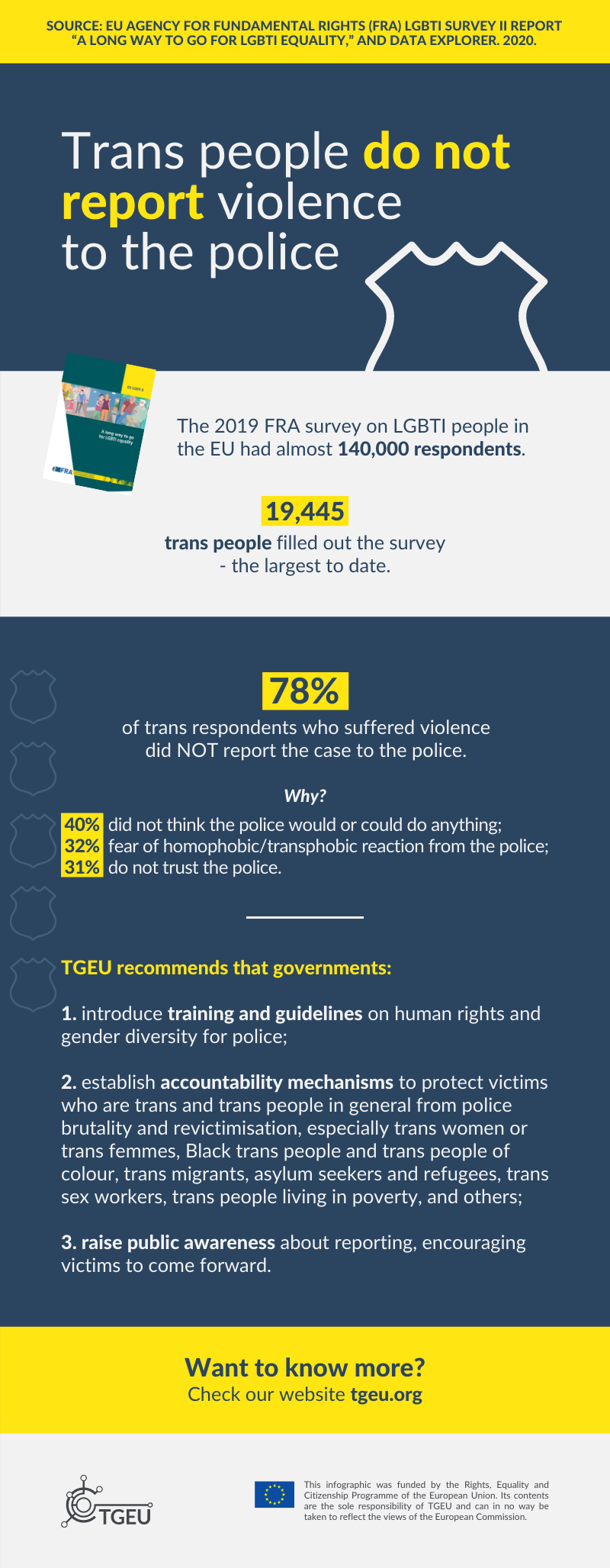
The EU LGBTI Survey II found that 78% trans respondents who suffered violence did NOT report the case to the police.
The top three reasons were:
- 40% did not think the police would or could do anything
- 32% fear of homophobic/transphobic reaction from the police
- 31% do not trust the police.
TGEU recommends that governments:
- Introduce training and guidelines on human rights and gender diversity for police.
- Establish accountability mechanisms to protect victims who are trans and trans people in general from police brutality and revictimisation, especially trans women or trans femmes, Black trans people and trans people of colour, trans migrants, asylum seekers and refugees, trans sex workers, trans people living in poverty, and others.
- Raise public awareness about reporting, encouraging victims to come forward.
Trans people are struggling financially

The EU LGBTI Survey II found that 46%* of trans respondents have difficulty making ends meet.
51% of intersex people, 35% of cisgender lesbian women, 32% of cisgender gay men, 39% of cisgender bisexual women, 36% of cisgender bisexual men reported difficulties.
- Household’s difficulty to make ends meet:
- With great difficulty 9.6
- With difficulty 12.4
- With some difficulty 25.6
- Fairly easily 26.6
- Easily 16.9
- Very easily 8.6
- Prefer not to say or don’t know 0.4
54% of trans women reported difficulties – the highest rate among all trans subgroups.
TGEU recommends that governments:
- Include gender identity and gender expression as protected grounds of discrimination in all areas of life.
- Make poverty reduction and social protection measures, including related to COVID-19, available and accessible to trans people.
- Ensure laws, policies, and practical measures against violence and discrimination account for multiple and intersectional discrimination, protecting trans youth, trans women, black trans people and trans people of colour, trans sex workers, and others.
- Gather data on housing insecurity, homelessness, poverty and social exclusion among trans people, disaggregated by gender identity, race, ethnicity, disability, and other aspects.
Trans people have the lowest levels of life satisfaction
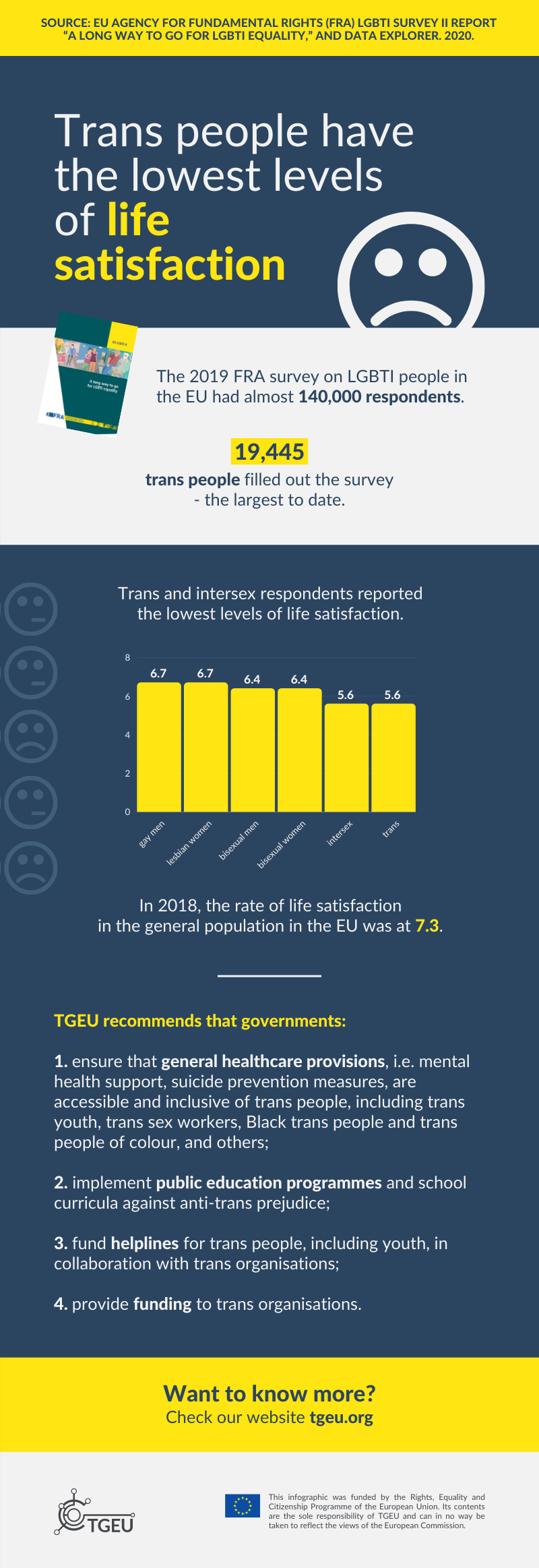
The EU LGBTI Survey II found that trans and intersex respondents reported the lowest levels of life satisfaction.
- Gay men: 6.7
- Lesbian women: 6.7
- Bisexual women: 6.4
- Bisexual men: 6.4
- Trans: 5.6
- Intersex: 5.6
In 2018, the rate of life satisfaction in the general population in the EU was at 7.3.
TGEU recommends that governments:
- Ensure that general healthcare provisions, i.e. mental health support, suicide prevention measures, are accessible and inclusive of trans people, including trans youth, trans sex workers, Black trans people and trans people of colour, and others.
- Implement public education programmes and school curricula against anti-trans prejudice.
- Fund helplines for trans people, including youth, in collaboration with trans organisations.
- Provide funding to trans organisations.